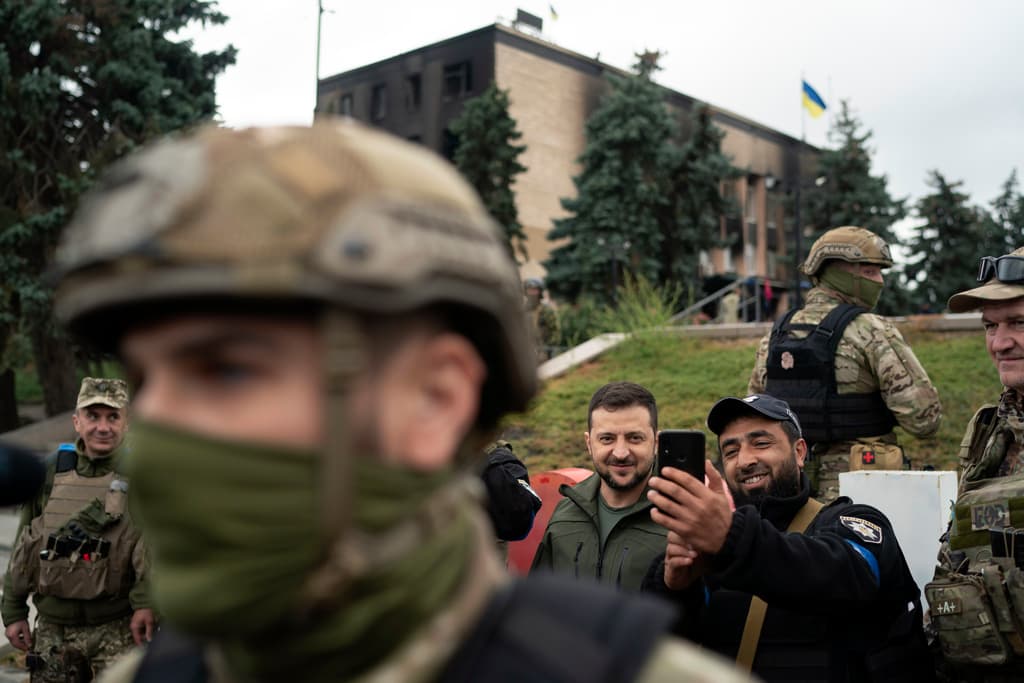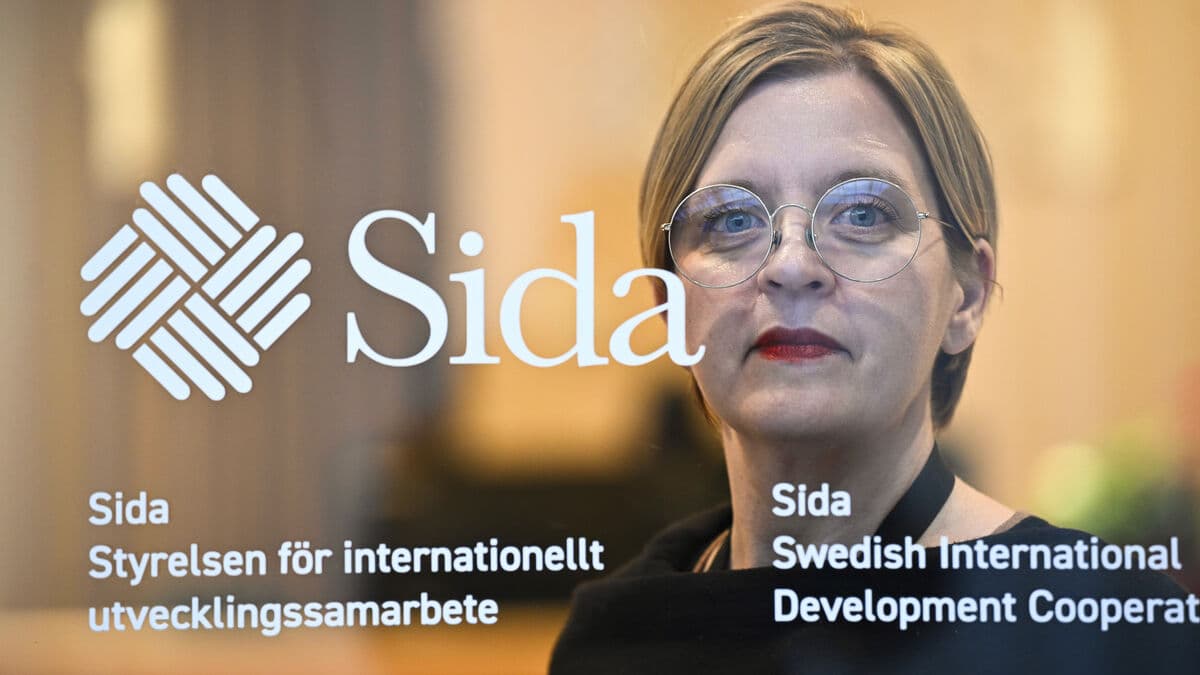When Ukraine stood up against the Russian large-scale invasion, support for Volodymyr Zelenskyj was rock-solid. When the country has become more pressured, it has affected its president.
Support for Zelenskyj is going down, but it is still significantly higher than it was before the large-scale invasion.
Ukrainians seem to have started getting tired of Volodymyr Zelenskyj.
Just a few weeks before Russia's large-scale invasion of the country, opinion polls showed that Ukrainians' earlier high hopes for the former actor had turned into growing discontent.
Then, at the beginning of 2022, a clear majority of the population thought that Zelenskyj was not doing a good enough job. A majority lacked confidence in him.
But then the big war broke out. The President changed from tight-fitting suits to military green functional clothing.
We are here. We are defending our independence, our state, and we will continue to do so, exclaimed Zelenskyj in one of his first appearances from Kiev when the invasion forces advanced towards the capital to overthrow him.
The Ukrainian defense managed to hold off the enemy against all odds. Nine out of ten Ukrainians rallied behind their president, and he was hailed as a hero in large parts of the world.
Wanted to compromise
The story of how Volodymyr Zelenskyj went from playing Ukraine's president in a TV series to becoming it in real life has been told many times.
When he was elected in 2019, many Ukrainians wanted something new – a fresh political breeze through a political establishment that had long been weighed down by oligarchs and corruption suspicions.
The then 41-year-old Zelenskyj entered the scene as a political novice and promised new approaches and new perspectives, partly regarding corruption but perhaps above all regarding the simmering conflict in the east and Russia's annexation of Crimea.
The sitting President and oligarch Petro Poroshenko had not managed to put an end to the low-intensity war, and few suspected the Kremlin's plans for a large-scale war.
Zelenskyj said he wanted to find a "constructive" solution through dialogue with Russia and expressed greater willingness to compromise. Poroshenko described his challenger as "Russia's favorite candidate".
In the end, Zelenskyj won the presidential election with 72 percent of the votes. In the parliamentary election that followed, his party gained a majority in parliament.
Criticized measures
During his first year as president, Zelenskyj fulfilled several election promises to the people's delight.
He introduced tough measures against Ukrainian oligarchs – a small group of extremely rich people who since the 1990s had had significant political influence, enjoyed monopoly positions, and owned large parts of the media sector. Members of parliament lost their legal immunity.
But the measures were also criticized for being too far-reaching and arbitrary, in a way that could be perceived as the government securing its own power position.
This is how you establish an authoritarian regime, said, for example, Swedish economist Anders Åslund to the corruption-investigating journalist group OCCRP in the summer of 2021.
Åslund was an advisor to Russian President Boris Yeltsin when the country took the sharp turn towards a market economy in the 1990s.
The President's own connections to influential billionaires raised questions, and in 2021, his name appeared in the large so-called Paradise Papers, as a former co-owner of shell companies in tax havens.
Met Putin in Paris
The war in the east continued.
The USA, which had long backed Ukraine, became increasingly less involved under the previous President Donald Trump.
Trump had stopped payments of military aid to Ukraine in a suspected extortion attempt where he wanted Volodymyr Zelenskyj to initiate a sensational corruption investigation of Joe Biden ahead of the American presidential election.
I really hope you and President Putin can meet and solve your problem, Trump said to Zelenskyj when they met in the USA.
Such a meeting did take place, but without American involvement. Zelenskyj and Putin met in Paris in December 2019. French President Emmanuel Macron and German Chancellor Angela Merkel sat at the table.
The meeting yielded no visible result, but the Ukrainian President was optimistic:
I am convinced that we will do it, together, he said after the meeting, in December 2019.
No compromise with the Kremlin became a reality.
Relatively popular
After two years of war, a failed large-scale offensive, and with large parts of the country still under occupation, the strong support for Volodymyr Zelenskyj has sunk.
During the spring, around 60-65 percent of Ukraine's population gave a thumbs-up to the President's work. Many also express continued concern about corruption and broken election promises – although these concerns are of clearly subordinate importance during the ongoing war.
Even though the President's mandate has had to be extended indefinitely due to the war, support for him to continue is strong. An overwhelming majority of the people believe that a new election should wait until the war is over.
The President in military green is the first to have a majority of the people on his side after five years in office.
On May 21, Volodymyr Zelenskyj's mandate formally expired after five years as President. The fact that a new presidential election was not held last fall, in the midst of the war, is due to the war laws in Ukraine.
Russia's propaganda media describe it as Zelenskyj "stubbornly" clinging to power. Vladimir Putin tries to imply that Ukraine no longer has a legitimate leader.
In Ukraine's constitution, it is stated that a presidential election should be held on the last Sunday in October during a sitting President's fifth and final year in office. It is also stated that the President retains their powers until a newly elected President has the opportunity to take over. And according to the war laws, it is not allowed to hold elections.
The constitution was adopted in 1996. The politicians who helped draft the law have told that the latter formulation was added as a safety net – precisely because they had fears about a future Russian invasion.
Born in 1978 and grew up in Kryvyj Rih in central Ukraine, with Russian as his native language.
Trained as a lawyer but chose a career as a comedian and actor.
Became known through the TV series "The Servant of the People" where he portrayed a history teacher who unexpectedly becomes elected as Ukraine's President.
Ran in 2019 and won the presidential election, defeating the sitting President Petro Poroshenko. Zelenskyj was open about his limited political knowledge, but said he was friendly towards NATO and the EU, and focused on resolving the conflict in eastern Ukraine through diplomatic means.
Is married to Olena Zelenska. The couple met in high school, got married in 2003, and have two children born in 2004 and 2013.






